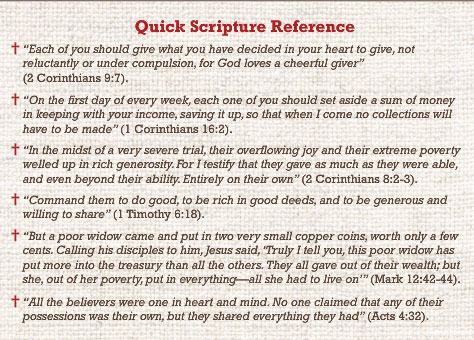By Scott T. Marshall, CPA, CFP®
I remember as a kid believing the story that swallowed gum stays in your stomach for seven years. Someone said it, and I received it as truth. At some point as I matured, I did some brief research to conclude that although swallowing gum was not recommended, it did not stay in your stomach for seven years. (I still don’t swallow my gum, I might add).
As believers in Christ, we hear messages preached often. Some messages we agree with; others we do not. The Bible teaches that we are to examine and know the Scriptures. We need to evaluate what is preached in light of what Scripture teaches.
Whether you grew up in a church, or whether you profess faith in Christ or not, I feel confident that you are somewhat familiar with tithing. Let’s first define tithing. In the broadest sense, tithing can be defined as “a tenth of one’s increase,” (Deuteronomy 14:22). In the Old Testament, the tithe is referenced many times in relation to giving a tenth of produce to the Lord. But how is the tithe referenced in the New Testament? Well, that’s where the discussion gets interesting.
Some scholars say that one-third of Jesus’ parables revolve around money and possessions, and that Jesus talked more about money and possessions than faith and prayer combined. So, it’s safe to say that Jesus certainly did not dodge this subject matter. But in all of his teachings about money and possessions, how often did Jesus speak about the tithe? To the best of my research, Jesus references the tithe only twice: Matthew 23:23/Luke 11:42 and Luke 18:12. And let’s just say the context of these passages is quite interesting.
Let me shift here and focus on some common ground with believers. “The earth is the Lord’s and the fullness thereof, the world and those who dwell therein” (Psalm 24:1). I think all believers agree that everything, and I mean everything, is ultimately the Lord’s. However, I have found in my own life that I can easily preach this message, but in actual life, I practice that after I give a certain amount, the rest is mine. This contradicts what Scripture teaches. How often do we give, wipe our hands clean, then live as if the rest is ours?
To return to our subject, it’s worth researching how giving in the Old Testament and New Testament may differ. Below is an excerpt from an article I recently read:
“Under the old covenant, tithing was required for the support of the old covenant ministers. The Israelites were required to give 10 percent—and their blessing was only a physical one! Christians in the new covenant have much better blessings—spiritual ones. How much more willingly ought we to give in thankfulness for the eternal blessings we have in Christ Jesus?”
The Israelites were commanded to give ten percent under a covenant that could not make them perfect (Hebrews 7:19; 9:9). How much more joyfully should we give to God under the new covenant? We have the sacrifice of Jesus Christ, which does cleanse our conscience (Hebrews 9:14). And yet it seems that in America today, even though we have so much more than the Israelites did, people give on average less than half the percentage the Israelites did. God calls on us to examine our hearts, to examine our priorities, and to be generous.
A person who is transformed by Christ to be more like Christ is generous. Such a person wants to give as much as possible to support the gospel and to support members in need. Christians should give generously—but giving is a result of their relationship with God, not a way to earn it. We are given grace through faith, not through giving.
New Testament giving could be characterized by being:
1) Willing and Cheerful
2 Corinthians 9:7
2) A Regular Pattern of Life
1 Corinthians 16:2
3) Proportionate to One’s Ability
2 Corinthians 8:3
4) Generous
2 Corinthians 8:2-3; 1 Timothy 6:18
5) Sacrificial
Mark 12:42-44; Acts 4:32; 2 Corinthians 8:3
In conclusion, how much you should give is a personal conviction that you should lay before God. Pray for wisdom, study His Word, and act in faith as the Lord leads you. The message to the materially rich may be, “to whom much is given, much is required.” To the materially poor, the message may be, “my grace is sufficient for you, for my power is made perfect in weakness.”
Scott T. Marshall, CPA, CFP® is the Founder and President of Rivertree Financial Planning, Originally from West Point, Scott is a graduate of the University of Mississippi where he received his Bachelors and Masters in Accountancy. Scott and his wife, Helen, reside in Jackson, MS with their three children, Artur, Taylor, and Molly. They are active members at Redeemer Church, PCA, in Jackson where Scott is a Deacon and serves on the Men’s Ministry team.
